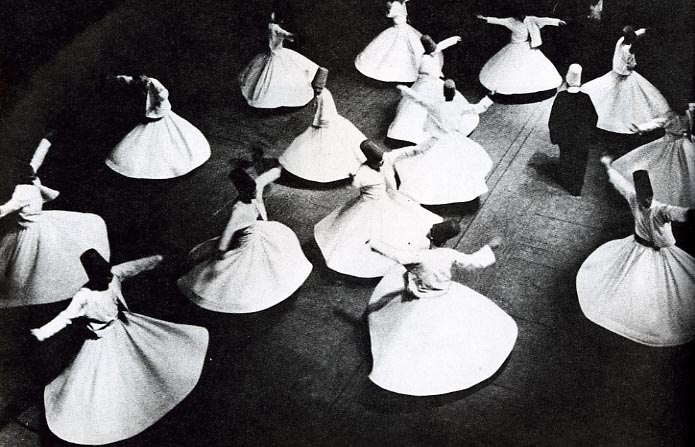Jalalludin Rumi was a Sufi mystic and poet who founded the Mevlevi Sufi order and the famous moving prayer of the whirling dervishes.
Rumi was the son of a theologian in 13th century Turkey, which was at that time a part of the Persian empire. The first part of his adult life was spent in religious study, meditation and teaching, until he met the wandering mystic Shams of Tabriz.
After that encounter, and through continued sohbet, or mystical conversation, with Shams, Rumi left the scholarly work and entered into the mystical Sufi path.
Rumi expresses through his poetry a deep devotion, often using the imagery of lovers and wine, which evoke- however dimly- the pure bliss he felt while in communion with God, his Beloved.
The ceremonial whirling is called the sema. The story goes that it was inspired by a spiritual experience Rumi had while in the marketplace one day, when suddenly the mundane sounds of life transformed into the music of the heavenly realms and he whirled in a state of ecstasy. Sema is an imitation of, and communion with the orbiting of the planets and the subatomic particles, and is now part of the legacy of Rumi’s Mevlevi Sufi order.
The Sufi devotees enter the sema in a formal way, first wrapped in black cloaks and wearing tall wool hats symbolizing their tombstone, the death of their personality. When the music begins the dark cloaks are shed, revealing white garments and the Sufis whirl in circles, under the guidance of the ever-watchful sheik, the teacher, guru, master.
The sema is a prayer of complete surrender to God, the letting go of the attachments to life and entering a timeless state in harmony with the universal rhythms.
Rumi died on December 17, 1273 and that day is a sacred Sufi holiday known as Sheb-i Arus, Rumi’s Wedding Night, celebrating when he was finally reunited with his Beloved.
“Those who don’t feel this Love
pulling them like a river,
those who don’t drink dawn
like a cup of spring water
or take in sunset like supper,
those who don’t want to change,
let them sleep
This Love is beyond the study of theology,
that old trickery and hypocrisy.
If you want to improve your mind that way,
sleep on
I’ve given up on my brain.
I’ve torn the cloth to shreds
and thrown it away.
If you’re not completely naked,
wrap your beautiful robe of words
around you,
and sleep.”
-Jallaludin Rumi, Diwan-e Shams-e Tabrizi (translated by Coleman Barks)
Musical piece: Mowashah Al Refku Be Maftoon from the album Nawa: Ancient Sufi Invocations & Forgotten Songs from Aleppo.

